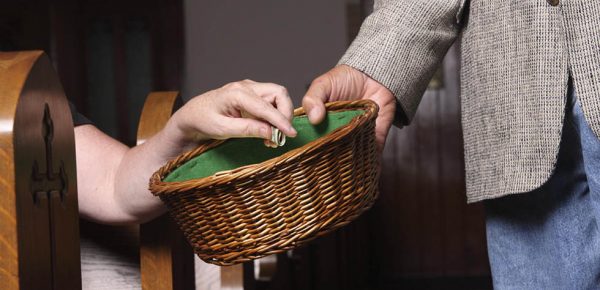Years ago, before I was ordained and we held reader services in our home, a frequent visitor would often drop a fifty-dollar or hundred dollar bill in the collection plate. Later, the Council members would giddily gather and pore over icon catalogues wondering how best to spend the money. The salad days of church planting are, in hindsight, the best!
Speaking of salad days, I remember as a layman putting a fifty-dollar bill in the plate as it passed by. I had wanted to give only a twenty, but thought it bad form to make change in the pew. Back then, forgive me, I remember dwelling on just how the parish would spend that increase!
As budgets grow and communities mature, the priest may say: “Ladies and Gentlemen, please stand. Now, reach your arms out forward. Grab the wallet of the person in front of you and give like you’ve always wanted to give.” That’s an old, old joke from – I’m just guessing here – the early days of the Church, but it’s true: we have no problem spending other people’s money. When it comes to giving our own money, it’s no laughing matter.
I like the old story about the guy who came to church with his family. As they were driving home afterwards the Dad was complaining about everything. He said, “The chanting was too loud. The sermon was too long. The announcements were unclear. The bulletin had typos. The building was cold. The people were unfriendly.” He went on and on, complaining about virtually everything. Finally, his observant son said, “Dad, you’ve got to admit it wasn’t a bad show for just a dollar.”
Fine: I’ll stop with the jokes – but only if you promise to keep reading (reading is free) while I mention the T word. This is not about “Big T” versus “Little T” traditions, but a more mundane and essential t. I’m afraid I’ll lose a few of you because, well, it’s not everyone’s cup of tea. Doh!
At the 2005 General Assembly of the Archdiocese in Detroit, Metropolitan Philip said:
Tithing, like praying and fasting, puts God first and teaches us to trust Him, rather than ourselves, as our leader. When we tithe, God is given the first part, the first tenth of the gifts that He gave to us. When we tithe, we enter into His ministry at a serious level that will allow the parish and the Archdiocese to minister as they should. Only when the parish and the Archdiocese operate at a level pleasing to God, can the people receive the ministry that God wants them to have. Contributing tithes to the Church is different from making a pledge. Tithes are based on what God has given us, not what we think the local parish needs to operate. Tithes also represent the first part, not what is left over after we pay our bills and have our recreation. Tithing represents a significant shift in thinking. That is why tithing, like praying and fasting, is a spiritual gift that deepens our relationship with God and changes our life.
When we read the Scriptures, we find that there are over 2,000 verses having to do with money and money management. Jesus speaks about money and money management more than any other topic, including heaven, hell, salvation, and so forth. The topic is very important for the Christian life.
In an often-misquoted verse, St. Paul the Apostle writes, “The love of money is the root of all evil” (1 Timothy 6:10). St. Paul teaches that our Lord realizes that we have needs to meet in order to live and to carry out His work. God is, however, a jealous God and demands our full commitment with nothing else taking precedence over His Lordship in our lives. That is why the Apostle Paul warns his first-century Greek congregation that the love of money is evil. All that we have is on loan from God. It is all gift. What we do with our time, talent, and treasures will be accounted for on the last day.
The above, of course, refers to Our Lord’s parable of the talents, which teaches that we are saved by grace given to us – and invested (Matthew 25:14–30). It’s a familiar story, but bear with me: A man, before traveling to a far country, called his own servants, and delivered his goods to them. He gave to each according to his ability. All are not created equal, but have different abilities in music, intellect, arts, business, religion, and so on. He gave one five talents, the other two, and yet another one. The servant with five talents invested them in trade, and earned another five talents. Likewise, the servant with two talents, invested them, and made two talents more. But the servant who had received one talent, dug a hole in the ground, and hid his lord’s money. The lord returned, and settled his accounts with his servant. The lord said to his servant, who had, per his abilities, received five talents – and invested them – and made five talents more, “Well done, good and faithful servant: you are faithful over a few things, I will make you ruler over many things, enter into the joy of your lord”. He rejoices and praises his servants who are faithful, and rewards them with shares of his kingdom (see 1 Corinthians 4:5, 2 Timothy 2:11–13). Likewise, the lord answers the servant to whom he had given two talents, and who had earned two talents more.
The servant who had received one talent said, “Lord, I knew you to be a hard man, reaping where you have not sown, and gathering where you have not scattered seed. Therefore, I was afraid, and went and hid your talents in the ground. Look and behold, there you have what is yours.” The servant fears God, but does not love him. He hates God (see Deuteronomy 5:9), who owns all things, because he does not own all things. He envies God.
The fear of the Lord does not mean that we are to be afraid of God, but to answer grace with grace in thanksgiving (see Hebrews 12:28, 1 Peter 2:17, Revelation 14:7, 19:5, 1 John 4:18–19). The lord answers his servant: “You wicked and lazy servant, you knew that I reap where I have not sown, and gather where I have not scattered seed. So you ought to have deposited my money with the bankers, and at my coming I would have received back my own with interest.”
The Lord sows the Word to bring heaven to earth, but he expects man to work to eat and to co-operate with grace (see 2 Thessalonians 3:10). Man has his own responsibility for his upkeep, and is the servant of God from the beginning in the garden, and throughout his life. God made man to know him, to love him, to serve him here on earth, and to enjoy him forever in heaven. The servant does not know he must serve; therefore, he is wicked and lazy. Thus, the Lord gives the one talent to him who has ten talents. “For to everyone who has, more will be given, and he will have abundance; but from him who does not have, even what he has will be taken away.” This is the law of reciprocity in the kingdom of heaven. God will give more and more to his faithful servants, but he will give less and less to those who do not believe in him. Christ comes that man might have life, and that they might have it more abundantly (see John 10:10). All God asks is that man remains faithful. God will reward man in due time.
God not only tolerates us, He gives us blessing and beauty. Because of this alone we should struggle. At the very least, for this alone we should love, because He first loved. We know the struggle, yet we are constantly forgetting the fearful Day when we must stand before our Creator and give answer. Instead, we waste time in fear of the day at hand, petty politics, ill health, worldly cares, and death. What we should fear is showing up short when the talents are tallied.
To return to missions and fledgling parishes: tithing is of great importance. It may often be the case that a greater percentage of parishioners do tithe in such communities, viewing the godly practice as essential for survival. The truth is, that’s the truth! Our bigger, more mature parishes can learn much from our “younger” brothers and sisters.
Speaking of the more established parishes, it should be noted that there is a difference between “fundraising” and “stewardship.” Fundraising means getting people to give more (usually for a specific purpose or project). Christian stewardship, on the other hand, helps people to be more giving.
Christian Stewardship could be defined as the “effective commitment or investment of human and material resources in participation with Christ in His love for others.” There are two primary points to be made. The first is that Stewardship always has to do with a Christian’s task to give away gifts that have already been given to him by God. This presupposes, of course, acceptance of the belief that all things are conferred on us by God. Jesus said, “Where your treasure is, there will your heart be also” (Matthew 6:21). Somehow, in some way, what a person does with his money, how he thinks about it, where he spends it, what he will do to earn it, and the things to which he will give it, are some of the real clues to who he is inside, to what is essentially important to him, to what is really in his heart. It is significant to note the order of things in the words of Jesus. He does not say, “Where your heart is there shall your treasure be also.”
My fifteen-year-old daughter recently lamented how students her age never had a typing (key-boarding) class. Many of us are old enough to remember those rooms full of big clunky typewriters and sentences like: Now is the time for all good men to come to the aid of their country. I hope you will forgive my hokey paraphrase: Now is the time for all good parishioners to come to the aid of their parish.
Just because one does not have abundance does not mean that one need not give thanks. We owe it to ourselves, our children, and those yet to enter our church doors to move forward, as able – in faith, with gratitude – toward godly stewardship. Tithing, giving ten percent of one’s income, is God-pleasing, as are all gifts offered by pious and cheerful givers with humble hearts. As His Eminence Metropolitan Joseph says:
Tithing is not just for converts.
It is not just for the rich.
It is for all of us. It brings us peace, knowing that we have given to God what is rightfully His.
It makes our parishes strong by providing the support it needs.
It builds up our youth, who see our gratitude to God and are in turn grateful to their parents.
Yes, if you really want your children to appreciate what you do for them, try being an example of gratitude.




















